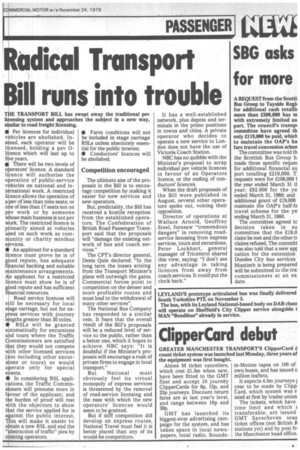°diced Transport ill runs into trouble
Page 23

If you've noticed an error in this article please click here to report it so we can fix it.
THE TRANSPORT BILL has swept away the traditional psv lieensing system and approaches the subject in a new way, slnllar to road freight licensing.
• Psv licences for individual ✓ hicles are abolished. Ins ead, each operator will be litensed, holding a psv 0licence which will last up to fiVe years.
• There will be two levels of operators' licence. A standard ence will authorise the operation of public-service vehicles on national and international work. A restricted liience allows the operation of a psv of less than nine seats; or one of less than 17 seats not on pSv work or by someone hose main business is not psv ork. The restricted licence is p imarily aimed at vehicles u ed on such work as comrriunity or charity minibus services.
• An applicant for a standard ence must prove he is of god repute, has adequate fi ancial backing and suitable aintenance arrangements. n applicant for a restricted ence must show he is of good repute and has sufficient financial resources.
Road service licences will still be necessary for local stage carriage, but not for expi-ess services with journey lengths greater than 30 miles.
• RSLs will be granted automatically for excursions and tours where the Traffic ommissioners are satisfied tliat they would not compete with other licensed services (lot including other excursions or tours) or would operate only for special events.
• In considering RSL applications, the Traffic Commis s oners will presume more in f your of the applicant; and t e burden of proof will rest ith the objectors to show that the service applied for is ar aingt the public interest. This will make it easier to obtain a new RSL and end the "abstraction of traffic" plea by existing operators. • Fares conditions will not be included in stage carriage RSLs unless absolutely essential for the public interest.
• Conductors' licences will be abolished.
Competition encouraged• The ultimate aim of the proposals in the Bill is to encourage competition by making it easier for new services and new operators.
But, predictably, the Bill has received a hostile reception from the established operators. The Confederation of British Road Passenger Transport said that the proposals will "damage the existing network of bus and coach services."
The CPT's director general, Denis Quin declared: "In the long term the losses arising from the Transport Minister's plans will outweigh the gains. Commercial forces point to competition on the denser and more profitable routes and must lead to the withdrawal of many other services".
The National Bus Company has responded in a similar vein. It fears that the overall result of the Bill's proposals will be a reduced level of service to the public, rather than a better one, which it hopes to achieve. NBC says: "It is doubtful if the Minister's proposals will encourage a rush of private firms to engage in local transport."
But National must obviously feel its virtual monopoly of express services is threatened by the removal of road-service licensing and the ease with which the new operators' licences would seem to be granted.
But if stiff competition did develop on express routes, National Travel must feel it is better placed than any of its would-be competitors. It has a well-established network, plus depots and terminals in the prime positions in towns and cities. A private operator who decides to operate a new service to London does not have the use of Victoria Coach Station.
NBC has no quibble with the Minister's proposal to scrap individual psv vehicle licences in favour of an Operators licence, or the ending of conductors' licences.
When the draft proposals of the Bill were published in August, several other operators spoke out, voicing their opposition.
Director of operations at Wallace Arnold, Geoffrey Steel, foresaw "tremendous dangers" in removing roadservice licensing from express services, tours and excursions. Peter Lockhart, general manager of Tricentrol shared this view, saying: "I don't see any advantage in taking licences from away from coach services. It could put the clock back."








































































































































